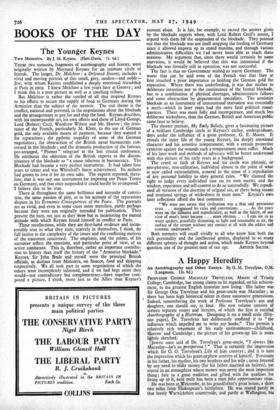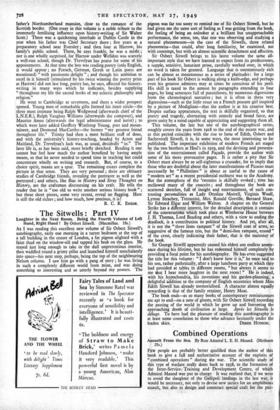A Happy Heredity
An Autobiography and Other Essays. By G. M. Trevelyan, O.M. (Longmans. 12s. 6d.) An Autobiography and Other Essays. By G. M. Trevelyan, O.M. (Longmans. 12s. 6d.)
PROFESSOR GEORGE MACAULAY TREVELYAN, Master of Trinity College, Cambridge, has strong claims to be regarded, on his achieve- ment, as the greatest English historian now living. His father was Sir George Otto Trevelyan and his great-uncle was Macaulay ; so there has been high historical talent in three successive generations. Indeed, remembering the work of Professor Trevelyan's son and daughter, one should say, in four. His new volume consists of sixteen separate essays and lectures, of which the first is entitled Autobiography of a Historian. Designing it on a small scale (fifty- one pages), Dr. Trevelyan has deliberately confined it to " the influence which impelled me to write my books." This permits a relatively rich treatment of his early environments--childhood, Harrow and Cambridge ; the picture of his grown-up life is more lightly sketched.
Jowett once said of Dr. Trevelyan's great-uncle, "I always like Macaulay—he's so prosperous! " That is certainly the impression which Sir G. 0. Trevelyan's Life of him conveys ; and it is here the impression which his great-nephew conveys of himself. Fortunate in his father, his mother, his two brothers and his wife ; never fettered by any need to nialte money (for his father married an heiress), yet reared in an atmosphere where money was never the most important thing ; heir to a great tradition and gifted with the qualities for living up to it, here truly has been a man felix opportunitate vitae.
He was born at Welcombe, in his grandfather's great house, a short two miles from Shakespeare's birthplace. He was reared partly in that lovely Warwickshire countryside, and partly at Wallington, his
father's Northumberland mansion, close to the romance of the Scottish border. (One essay in this volume is a noble tribute to the immensely fertilising influence upon history-writing of Sir Walter Scott.) There was a quickening interlude at Dublin Castle in the year when his father was Chief Secretary there ; five years at a preparatory school near Eversley ; and then four at Harrow, his family's public school. There, he says frankly, he was a misfit ; nor is one wholly surprised, for Harrow under Welldon was scarcely a well-run school, though Dr. Trevelyan has praise for some of his appointments. At that time the boy was reading poetry (only English, it would appear ; no French, German, Greek or Latin poets are mentioned) " with passionate delight " ; and though his ambition to excel in it himself (stimulated by his twice winning the poetry prize at Harrow) did not last long, poetry has, he says, affected his history- writing in many ways which he indicates, besides supplying " throughout my life the sacred books of my eclectic philosophy and religion."
He went to Cambridge at seventeen, and there a wider prospect .opened. Young men of remarkable gifts formed his inner circle—the three most intimate being Ralph Wedgwood (afterwards chief of the L.N.E.R.), Ralph Vaughan Williams (afterwards the composer), and Maurice Amos (afterwards the legal administrator and jurist) ; to which were later added Geoffrey Winthrop Young, poet and moun- taineer, and Desmond MacCarthy—the former " my greatest friend throughout life." Trinity had then a most brilliant staff of dons, and with the university's history-teaching, headed by Acton and Maitland, Dr. Trevelyan's luck was, as usual, decidedly " in." The later life is, as has been said, more briefly sketched. Reading it one cannot but feel how much the author benefited by having ample means, so that he never needed to spend time in teaching but could concentrate wholly on writing and research. But, of course, to a choice spirit, means are a spur. The remaining essays complete the picture in that sense. They are very personal ; three are obituary studies of Cambridge friends, revealing the portrayer as well as the portrayed ; and others, like Bias in History and Stray Thoughts on History, are the craftsman discoursing on his craft. He tells the reader that he is " too old to write another serious history book " ; but these short pieces, some very recent, reveal no flagging. Here is still the old riches ; and how much, how precious, it is!
R. C. K. ENSOR.







































 Previous page
Previous page